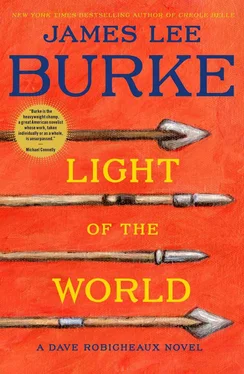“You tell me.”
“I went to meet her at the stone cabin the Youngers own on Sweathouse Creek. I went to tell her I’d made a mistake, that I didn’t want to hurt her and maybe not her husband, either. I went there to tell her I was wrong.”
“What happened?”
He had put down his biscuit and was staring at his plate. “She said she and her husband had just visited their daughter’s grave. She said he was full of grief. She said maybe he wasn’t such a bad guy after all.”
“That should have been it, right? I mean, she was admitting the mistake, and so were you. That’s all people can do.”
“It didn’t work out that way. She said she’d fallen in love with me and she didn’t want me to go away. She didn’t care if I was old or fat or a drunk or a guy who’s done some stuff he won’t ever talk about.”
“You got it on with her?”
“Why don’t you put it up there on the blackboard so the customers can read about my sex life while they check out the daily special?”
“Clete, what are you doing?”
“Getting my daughter out of the can. I thought that’s why we came to town.”
“I didn’t mean to sound judgmental.”
“Except you are judgmental, and it makes me feel like somebody poured liquid pig flop in my shoes.”
“Is she going to leave her husband?”
“We didn’t talk about that.”
“This is going to tear you up, partner.”
“What am I supposed to do about it? Rip out my genitalia? Kill myself?”
“Bail out of it.”
“That’s why I met with her at the cabin Sunday night. Except things didn’t work out as planned. I didn’t get home till two in the morning.”
I started to tell him I didn’t need any more details, then realized how cruel that would be. Across the street, the homeless people were out on the sidewalk sailing a Frisbee. “We’ve been in worse trouble,” I said.
“When?” he asked.
“Gretchen didn’t do Zappa. That’s all we have to keep in mind right now. We get her out of jail, and we get rid of this bogus murder beef,” I said.
“How?”
“I saw an antique Winchester inside the camper shell on Wyatt Dixon’s truck. It looked like an 1892, the one with the elevator sight. It wouldn’t be unlikely for him to own a couple of smoothbore black-powder pieces. Montana has a primitive weapons big-game season that opens in the early fall. It’s the kind of gig Dixon would be up for.”
“You think Dixon capped Zappa?”
“He told me an eye for an eye. I think he meant it.”
“I got something else bothering me, Dave. You think Gretchen might have a thing for Dixon?”
“She has better judgment,” I replied.
“But it’s a possibility?”
“Give her some credit.” I tried to sound convincing. I doubted if anyone knew what went on inside the head of Gretchen Horowitz.
“This is a crock, isn’t it?” Clete said.
“We need to get to the heart of the problem. Elvis Bisbee isn’t going to be much help.”
“Asa Surrette is at the center of it all?”
“Yeah, the guy who probably wants to do things to Alafair that most people can’t imagine. I can’t sleep thinking about it. We’ve got to put this guy out of business.”
“To what degree?”
When I didn’t reply, he picked up his fork and started eating. His food had grown cold; he was chewing and swallowing it as he would cardboard. He drank a glass of water and looked at me, his face round and flat. “Answer my question, Dave. How do we play this one?”
“We wipe him off the planet,” I said.
“That’s more like it, big mon.”
No, it wasn’t. Grandiosity is always the mark of fear and uncertainty, and as soon as I’d spoken those words, I knew they would come back to mock me.
Asa Surrette was officially dead, even though he had left a note under Alafair’s windshield wiper outside the Lolo post office. I wanted to be angry at the authorities in Kansas and also at the FBI for concluding that he had died in the collision of the prison van with the tanker truck. Unfortunately, I had been guilty of the same obtuseness when Alafair told me she was sure Surrette was stalking her.
After we returned from the jail with Gretchen, I sat down with a legal pad and a felt-tip pen by our bedroom window and began writing down as many details as I could about Surrette. Any detective who has investigated serial killings, or any psychiatrist who has spent time interviewing psychopaths such as the cousins Angelo Buono, Jr., and Kenneth Bianchi or the satanist Richard Ramirez or the BTK killer, Dennis Rader, will be the first to tell you that behavioral science tends to fall apart when you probe the souls of men like these. It’s not unlike an attempt to fathom the origins of the universe. At a certain point, the laws of science lose their applicability.
When it came to motivation, misogyny was often in the mix. So was pedophilia. These two forms of psychosis did not explain the level of violence and savagery the perpetrators inflicted on their victims. I have my speculations, although they are founded on personal experience and not the results of any study I’m aware of. I have known many cruel people in my life. Their cruelty, in my opinion, was the mask for their fear. It’s that simple.
We all agree that anyone who is cruel to animals is a moral and physical coward and undeserving of the air he breathes. This same person, however, has a way of working himself into a position of authority over others, often children, even though all the warning signs are there. I’ve never understood our collective unwillingness to question the authority of a predator who happens to acquire a badge or an insignia or a clerical collar or who carries a whistle on a lanyard around his neck. Without our sanction, these pitiful excuses for human beings would wither and die like amphibians gasping for oxygen and water on the surface of Mars.
The motivations of a psychopath are almost irrelevant in an investigation. Psychoanalytical speculation about a moral imbecile makes for great entertainment, but it doesn’t put a net over anyone, and you do yourself no favor by trying to place yourself inside his head. The methodology of the psychopath is a different issue, one that frequently proves to be his undoing. In all probability, the perpetrator’s pattern will repeat itself, primarily because he’s a narcissist and thinks his method, if it has worked once, is fail-safe; second, the psychopath is not interested in the hunt but, rather, in assaulting and murdering his prey, unlike a professional thief, who is usually a pragmatist and considers theft an occupation and not a personal attack upon his victim.
Asa Surrette’s pattern in Kansas was not imaginative. He used his job as an electrician to enter the victim’s home and lie in wait. He bound and tortured and suffocated most of his victims and ejaculated on the women and girls but did not penetrate them. He posed them and took trophies home — purses, underwear, costume jewelry, wedding rings, driver’s licenses. If he took money from the crime scene, it was coincidental.
I had created two columns on my legal pad, one detailing the characteristics of Surrette’s crimes and the other a list of his jobs, the uniforms he might have worn, his travels, and his known friends.
I compared the information I had written on the legal pad with what I knew about his crimes in Montana, if indeed Asa Surrette was the same man who had shot an arrow at Alafair and left the message on the cave wall and murdered Angel Deer Heart and Bill Pepper and perhaps the pilot whose twin-engine Cessna had exploded west of Missoula.
The murders in Wichita were aimed at women and girls with whom he had no known prior contact. Was the same true of Angel Deer Heart? Why would a seventeen-year-old girl leave a biker nightclub full of music and excitement and go off with a seedy old man who had the social appeal of a soiled litter box?
Читать дальше












